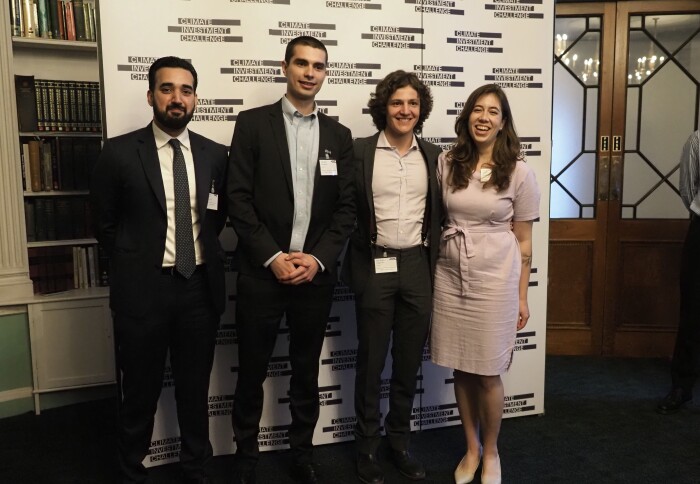Imperial students win climate prize for peatland wet farms funding project

From L-R: Zarak Pasha (Standard Chartered), with the winners: Pietro Hughes, Mathieu Laporte and Ieva Steponaviciute
A team of students from Imperial’s Centre for Environmental Policy has been awarded the top prize in the global Climate Investment Challenge.
Pietro Hughes, Mathieu Laporte and Ieva Steponaviciute are due to graduate from their MSc taught course in Environmental Technology in October 2023. They won the main competition prize for their GreenPeat Capital project. They also won £10,000 to further develop their project which explores the potential of wet farming to restore European peatlands, while also creating sustainable livelihoods.
The team’s idea is to create a blended finance fund that provides loans to farmers to grow wet farming crops such as reed, sphagnum moss and cattail on peatlands. To let farmers have the time to transition and develop new revenue streams before asking for any repayment, farmers would benefit from a three year repayment holiday coming with technical assistance. Once wet farming has been established, farmers would earn revenue from new crop yields as well as from carbon markets for reducing greenhouse gas emissions from peatlands.
Mathieu Laporte, one of the students from the winning team said: “We are very pleased that the judges recognised the potential of our project. Our approach is a private credit fund offering long-term loans to help farmers cover the upfront costs of switching to wet farming, and consulting services offered in partnership with leading experts to facilitate the transition.”
He continued: “We plan to use the prize money this summer to explore how we could best operationalise the fund to make the project a reality."
As part of their next steps, the team are looking to collaborate with Imperial alumni who have experience in agricultural or entrepreneurial investment.
"In the face of a global climate emergency, more apparent now than ever, it is exemplary that this competition generates so much interest and so many novel and applicable ideas." Dalia Daou Director of the Centre for Climate Finance & Investment
The runners-up in this category were Imperial MSc Business Analytics students Imogen Bakhtari, Amith Sompalli and Juan Ruel for their sustainable property fund, an investment fund aimed at retrofitting the UK's commercial property stock ahead of the 2025 changes to Energy Performance Certificate regulations.
The competition was set up four years ago to encourage students across the world to develop and describe creative financial solutions and innovations addressing the defining challenge of our time – climate change. This year, the judges reviewed entries from more than 120 teams of 400 students in 23 countries and awarded four prizes.
Dalia Daou, Director of the Centre for Climate Finance & Investment at the Business School commented: “My congratulations to all the finalists from around the world for their ideas to increase the funding of solutions to combat climate change, and especially to the overall winners, who are studying here with us at Imperial. In the face of a global climate emergency, more apparent now than ever, it is exemplary that this competition generates so much interest and so many novel and applicable ideas. I look forward to seeing these students’ proposals develop into real-world solutions.”
Outgoing competition Chair, Serena Taylor, commented: “The competition is going from strength to strength and this year’s winners really showcase the power of student-led innovation. Each of the winning projects has a tangible climate impact and a route to scale, so I look forward to reading about their successes in future. We are very grateful to our sponsors, Standard Chartered, Candrium, Quinbrook and the UK Centre for Greening Finance and Investment (CGFI) for their investment in our future through these climate entrepreneurs.”
This year for the first time, the competition was also supported by the Greenhouse Accelerator, part of Undaunted, a partnership between two world-renowned scientific institutions: Imperial College London and the Royal Institution, so all ten finalists will receive additional start-up support to help turn their ideas into reality.
The main competition, won by Imperial students, and the emerging markets category (which was awarded to the University of Waterloo for a project to reduce carbon emissions in Tanzania through fire management programmes) are the mainstays of the competition. For these prizes, judges were looking for solutions that use existing financing mechanisms to address climate change - specifically covering the impact on climate, feasibility and scalability.
This year, there were also two new categories. The data analytics prize, run in collaboration with the CGFI, aims to integrate finance and data science, connecting investors with accurate data around their social and environmental impact. It was won by a team from Cambridge University for a project that looked at social risk alongside climate risk when transitioning from coal energy in India.
The financial disruption prize challenges students to disrupt the finance industry in a climate positive way and was developed in recognition of the start-ups coming out of this competition in previous years. It was awarded to a team from London Business School and Columbia Business School for their project to open investment in green assets to private investors.
Article text (excluding photos or graphics) © Imperial College London.
Photos and graphics subject to third party copyright used with permission or © Imperial College London.
Reporter
Corinne Farrell
Communications Division